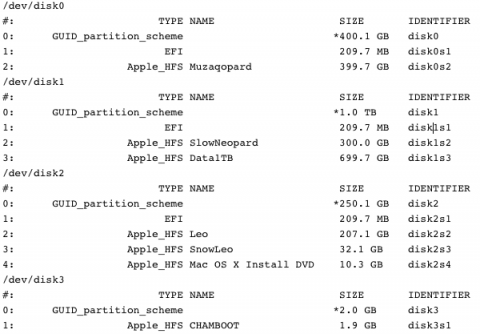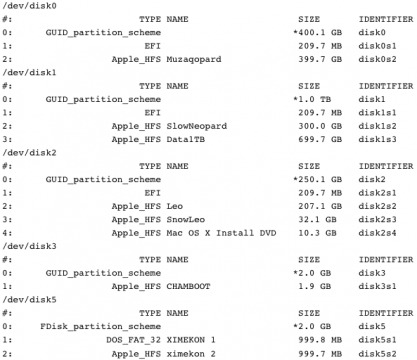1. Abstract
You have the situation that you installed Chameleon for security and compatibility purposes on an external USB-stick. For safety reasons you should consider making a backup. But all diskimaging (either Apple’s Diskutility, Carbon Copy Cloner or Super Duper) tools fail to create a proper backup since the bootblock is just not copied. So you end up with having to create a second usb-stick, but this takes time. So why not copying it? In the following article we’ll show you some basic steps to create a proper backup of your precious Chameleon bootable USB-Stick.
This session is not considered for newbies. You need to understand the steps and understand that you can completely destroy your system when you apply certain steps in a wrong way. The following steps comprise a forum threat on OSX86.net.
2. Walkthru: Backing up your Chameleon USB-Stick
2.1. Determining the device number of your Chameleon USB-Stick
- open a terminal and enter this:
diskutil list - you will receive output that may look similar to this:
- in the above example you see, that diskutil recognizes 4 drives:
disk0has a size of 400GB and contains one partition (“Muzaqopard“)
disk1has a size of 1 TB and contains two partitions (“SlowNeopard” and “Data1TB“)
disk2has a size of 250GB and contains three partitions (“Leo“, “SnowLeo” and aMac OS X Install DVD Imagefor safety purposes)
disk3has a size of 2GB and contains one partition (“CHAMBOOT“) disk3is in my case the Chameleon USB-Bootstick, it is very unlikely that you’re gonna have the same diskid for your USB-Stick.
2.2. Backing up your precious Chameleon USB-Bootstick
- the backup process is based on a simply yet effective unix command named
dd - still on the terminal enter this:
sudo dd if=/dev/rdisk3 of=/chamboot.img bs=4k sudostarts the following command as superuser, so you will have to provide your passwordddsimply does a block copy of my Chameleon USB-Stick, which is mounted on my system as disk3 and copies it into a file named chamboot.img which is located at the root of your directory structury.- note that it is very, very, very unlikely that you will have your USB-Bootstick mounted as disk3 aswell. You will have to replace rdisk3 with your rdiskID. If you do this wrong, you can terribly screw your system. Be warned.
- note the difference between the output of diskutil (
/dev/disk3) and the applicable dd command (/dev/rdisk3) and - note that the copying process for a 2GB stick takes on my system almost 6mins. So don’t interrupt it, just leave it alone, keep prepping yourself a tea, a coffee or a single-malt ;-)
- after successful backup your terminal will show a line similar to this:
488191+1 records in
488191+1 records out
1999633920 bytes transferred in 346.651079 secs (5768434 bytes/sec) - it shows, that 2GB has been copied in 346secs (roughly 5mins and 46secs)
- In case you have a 16GB Chameleon-Boot USB-Stick the backup process may take up to 60mins (sic!)
3. Walkthru: Process of Restoring to a new USB-Stick
3.1.Determining the device number of your new USB-Stick
- plug in a new USB-Stick of a least the same size like the original Chameleon USB-Stick was (in my case: 2GB)
- open a terminal and enter this:
diskutil list - you will receive that may look similar to this:
- in my case here I have a USB-Stick mounted as disk5. It has a size of 2GB and contains two partitions (“XIMEKON 1” and “ximekon 2”).
3.2. Restoring your precious chamboot.img to a USB-Stick
- note that all data on that USB-Stick will be deleted (in my case: “XIMEKON 1” and “ximekon 2” will be deleted)
- at first I need to manually unmount my two partitions. On the terminal I enter this:
sudo umount -f "/Volume/XIMEKON 1"
and
sudo umount -f "/Volume/ximekon 2" - note that in your case you most likely will have to only unmount one partition (!)
- the main part of the restoring process is based on the very same
dd commandlike creating the backup image (in my case: chamboot.img) - on the terminal enter this:
sudo dd if=/chamboot.img of=/dev/rdisk5 bs=4k - now the chamboot.img from the root of my directory structure is taken and copied to the device rdisk5 with a blocksize of 4k.
- note that the copying process again takes like ages (for my 2GB USB-Stick about 6mins).
- after successful backup your terminal will show a line similar to this:
488191+1 records in
488191+1 records out
1999633920 bytes transferred in 1462.457165 secs (1367266 bytes/sec)
- it shows, that 2GB has been copied in 1462secs (roughly 25mins)
- In case you have a 16GB Chameleon-Boot USB-Stick the backup process may take up much longer.
4. Final words
You’ve seen that copying a USB-Bootstick containing Chameleon or derivates is easy. Depending on the size of the USB-Stick it may just take time. Our recommendation is simple, take small USB-Sticks from the very beginning. 128MB sized USB-Sticks are in our opinion the ideal size, but they will not be easy to get on the markets these days. That’s why we think taking 2 or 4GB sized USB-Sticks is also within the range of an efficient trade-off. We would not recommend to take larger USB-Sticks, as the process of restoring will take like forever. As the process of writing to a USB-Stick with the dd command is statistically a linear process, we suspect that restoring a 16GB USB-Stick can take up to 4hrs.
We hope we could help you a bit here and you had some fun. If you consider this tutorial helpful, you may visit one of our sponsors. Believe us, they really got the coooooolest offers ;-)



checking the current status of the copy process with:
killall -INFO dd